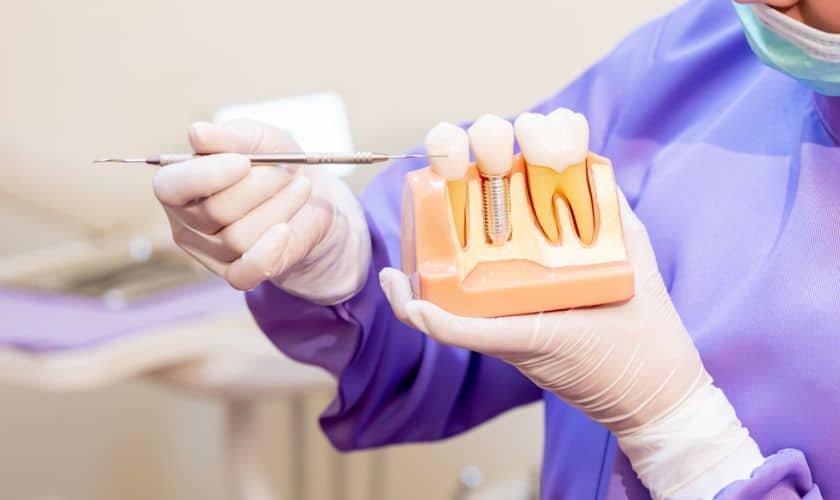People who are losing their teeth have a crucial decision to make: between dental implants and dentures. Every option has unique benefits, so it’s critical to understand how they vary to help you make an informed choice about oral health that fits your requirements and lifestyle. We’ll examine the features, benefits, and factors of dental implants and dentures in this post to assist you in choosing the best option for your smile.
Dental Implants: A Permanent Solution:
Modern dental implants are a great way to replace lost teeth. Dental implants are made up of a custom-made crown, an abutment, and a titanium post that is surgically inserted into the jawbone to resemble real teeth. This permanent and durable option offers several advantages:
- Natural Look and Feel: Natural teeth are closely imitated in both look and functionality by dental implants. The color, form, and contour of the crown are tailored to match the existing teeth, giving the appearance of a seamless, genuine tooth.
- Permanent Solution: Dental implants, as opposed to removable dentures, are a fixed and long-term treatment. After being implanted, they become a stable part of your mouth, so adhesives or removal are not necessary.
- Preservation of Jawbone Health: In order to stop bone loss, which frequently happens after tooth loss, dental implants stimulate the jawbone. Over time, this stimulation aids in preserving the density and integrity of the jawbone.
- Longevity and Durability: Dental implants have an extended lifespan with adequate maintenance. Because of their extreme durability and decay resistance, they offer a long-term answer to anyone looking for a dependable tooth replacement alternative.
- Restoration of Bite Functionality: With dental implants, your bite is fully restored, enabling comfortable eating, speaking, and chewing. The entire quality of life and dental health are improved by this increased functionality.
- Dentures: The conventional and popular approach to replace lost teeth is with dentures. They are made consisting of an acrylic or metal framework that may be removed to reveal prosthetic teeth. Complete dentures, for those with full arches, and partial dentures, for those with some natural teeth remaining, are the two main types of dentures. Here are some key aspects of dentures:
- Affordability: Dentures are a more affordable choice for people looking to replace a missing tooth on a limited budget than dental implants since they are frequently more affordable.
- Removability: Because dentures are removable, they are simple to maintain and clean. For some people, this function might be useful since it makes it easier to maintain regular oral hygiene and clean the mouth and dentures.
- Immediate Solution: A speedier option for tooth replacement may be dentures. Dentures may be made and positioned rather quickly, in contrast to dental implants, which need a healing time following surgery.
- Adjustability: It’s possible for the gums or jaw structure to alter over time. Dentures offer a certain amount of fit flexibility since they may be relined or modified to account for these changes.Minimal Invasive Procedure: Dentures are a less intrusive choice for those who might not be good candidates for dental implants since the process of getting dentures requires fewer surgical procedures than implant surgery.
Considerations for Decision-Making:
- Oral Health Status: Your dental health status at the moment is a major factor in choosing the best course of action. For dental implants to integrate well, a strong jawbone is necessary, however for those whose jawbone health is damaged, dentures could be a good option.
- Cost Considerations: Comparing dental implants to dentures, the initial outlay is typically more. Think about your spending limit and compare the long-term advantages of each choice.
- Lifestyle and Comfort: Your choices and way of life are important considerations. Dentures may feel more convenient or pleasant to some people than dental implants, which provide a more natural feel.
- Long-Term Goals: Think about your long-term dental health objectives. Dental implants offer a long-term solution for dental health, although with time, dentures could need more regular changes.
- Consultation with a Professional: Make an appointment for a consultation with your dental health care provider or dentist. They are able to evaluate your requirements, talk about possible difficulties, and help you come to a conclusion that is well-informed for your situation.
Conclusion:
Selecting between dentures and dental implants, including Dental Implant Livermore, is a personal choice. Each method has benefits based on personal preferences and long-term dental health objectives. Seeking advice from a dental specialist is essential throughout this procedure, as they can provide customized direction based on your unique requirements and situation.

